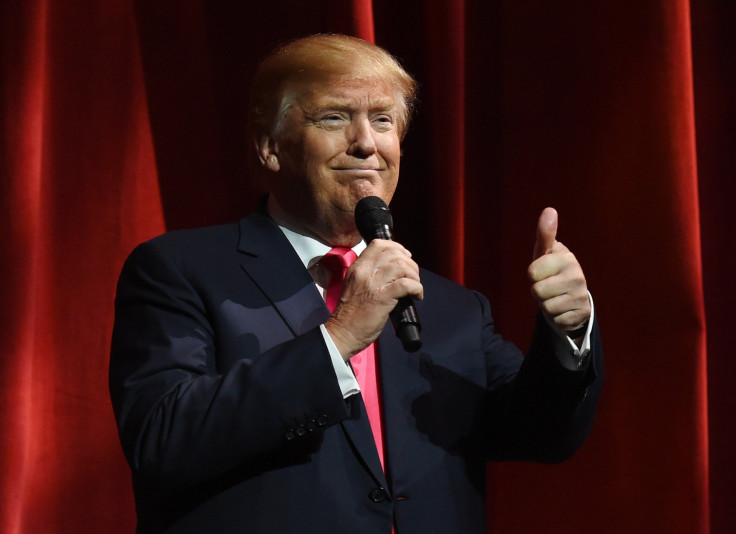National Review Panics, Disowns Donald Trump In Special Issue

The National Review has come a long way since 2008 when top editor Rich Lowry said Republican vice presidential candidate Sarah Palin gave him a fuzzy feeling inside. Palin resurfaced this week with an enthusiastic and rambling endorsement of GOP front-runner Donald Trump. On Thursday night, however, National Review parted ways with Lowry's political crush and released a special issue full of conservative writers united behind the cover, "Against Trump."
National Review's new cover: "Against Trump" cc @realDonaldTrump pic.twitter.com/FUrHg9srkF
— Ryan Lovelace (@LovelaceRyanD) January 22, 2016The legacy publication of New York conservative icon William F. Buckley — whom Trump actually namechecked in the last GOP debate — National Review appears eager to rescue the Republican Party from Trump's gaudy and crass brand. Insofar as the magazine is still committed to Buckley's vision of an intellectual, respectable conservatism, discrediting a figure like Trump appears to be a top priority.
The gallery of contributors ranged from superstar libertarian and fashion mogul Glenn Beck, Tea Party grandee and pretend newspaper columnist Brent Bozell III, and founder of the conservative blog The Federalist and plagiarist Ben Domenech.
Unlike other branches of the media, decrying Trump's bigotry is not National Review's angle. The editorial published online Thursday didn't complain at all about Trump's comments about Mexicans or Arabs, his threats to kill family members of suspected "terrorists," his ejection of journalists from press conferences, or his proposed ban on Muslims, including American citizens, from entering the United States. It attacks his plan to deport millions of undocumented immigrants, not because it strikes the authors as morally questionable, but simply because it is a "logistical task beyond the capacity of the federal government."
Instead, National Review lambasted Trump as a threat to the Republican Party's legitimacy and unity, specfically, "a philosophically unmoored political opportunist who would trash the broad conservative ideological consensus within the GOP." Despite previous articles that appear sympatico with Trump on issues ranging from Black Lives Matter to immigration to the Muslim world to Lowry's deep fondness for Sarah Palin, the magazine is apparently drawing the line now that it's officially 2016.
One of the barbs against Trump, about halfway through, is that he merely took over his business empire from his father. (John Podhoretz, who inherited his magazine, Commentary, from his father, contributed to this issue.)
The editors also appear fed up with Trump's vulgar and classless bravado. "His refusal to back down from any gaffe, no matter how grotesque, suggests a healthy impertinence in the face of postmodern PC," the editorial wryly notes. This jab may surprise those who recall one of the contributors to this issue, conservative radio host Dana Loesch, once endorsed the group of U.S. Marines who urinated on the corpses of Taliban soldiers. ("I'd drop trou and do it too. That's me, though. I want a million cool points for these guys.")
The piece also slams Trump as wobbly on foreign policy, and later says, "Politicians have records of success, failure or plain backsliding by which their promises may be judged." Contributor William Kristol, co-founder of the Weekly Standard, though, is widely mocked in journalism circles for his persistent knack for being mistaken, from predicting the Iraq War would be a rousing success, to joining Lowry in hyping Sarah Palin as a winning candidate in 2008, to pronouncing that Sen. Barack Obama would not win a single Democratic primary.
.@NRO pic.twitter.com/IRLchb2Q2j
— LightsCameraMenaker (@willmenaker) January 22, 2016
Kristol has also led the pack of his fellow contributors in falsely prophesying the arrival of what he calls "Peak Trump," beginning in July of last year and continuing, undeterred, for six months as Trump effortlessly ascended in the national and state polls.
A sample:
#PeakTrump. "Support for Trump fell sharply on the one night that voters were surveyed following those comments."
http://t.co/PWDsqDbb3a
— Bill Kristol (@BillKristol) July 20, 2015Memo to @realDonaldTrump: We are past PEAK TRUMP! Sell-by date approaching. Plan EXIT STRATEGY before Iowa! ADIOS amigo! #ArtOfTheWithdrawal
— Bill Kristol (@BillKristol) July 22, 2015#PeakTrump. https://t.co/FPQmGAZKfi
— Bill Kristol (@BillKristol) July 27, 2015I do think (but I've been saying this for two weeks, so, for take it for what it's worth) we've seen Peak Trump.
— Bill Kristol (@BillKristol) August 7, 2015GOP debate special! A midnight podcast!
"Finally, Perhaps We've Really Seen Peak Trump."
http://t.co/ApGo1Mwj6l
— Bill Kristol (@BillKristol) August 7, 2015Light at end of the tunnel? Trump dropping in national, Iowa and NH polls. #PeakTrump.
— Bill Kristol (@BillKristol) August 11, 2015Peak Trump. https://t.co/ReXU8pEQEK
— Bill Kristol (@BillKristol) August 14, 2015I'll admit I was a bit early in my #PeakTrump call. @realDonaldTrump actually peaked in RCP averages on Sep. 19, 2015.
— Bill Kristol (@BillKristol) November 3, 2015Prediction: Peak Trump will prove to be just before 7:00 pm, Dec. 29, 2015, when he foolishly attacked @weeklystandard.
#HitlerInvadesRussia
— Bill Kristol (@BillKristol) December 30, 2015Perhaps now that National Review has weighed in, Kristol's dream of Peak Trump will come true at last.
© Copyright IBTimes 2024. All rights reserved.






















